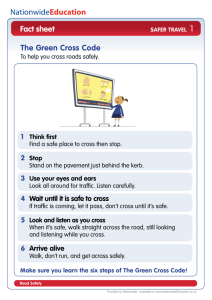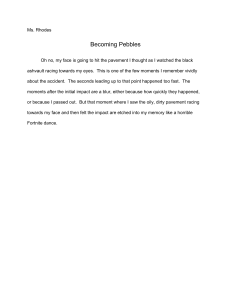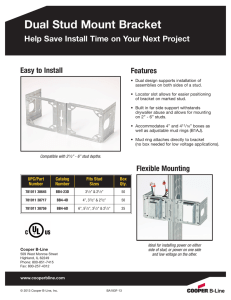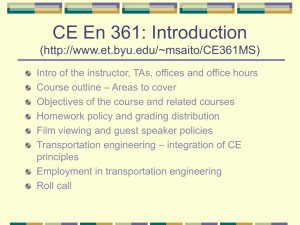IRJET-Self-Cleaning of Street by Sewage Treated Water using Street Stud
advertisement
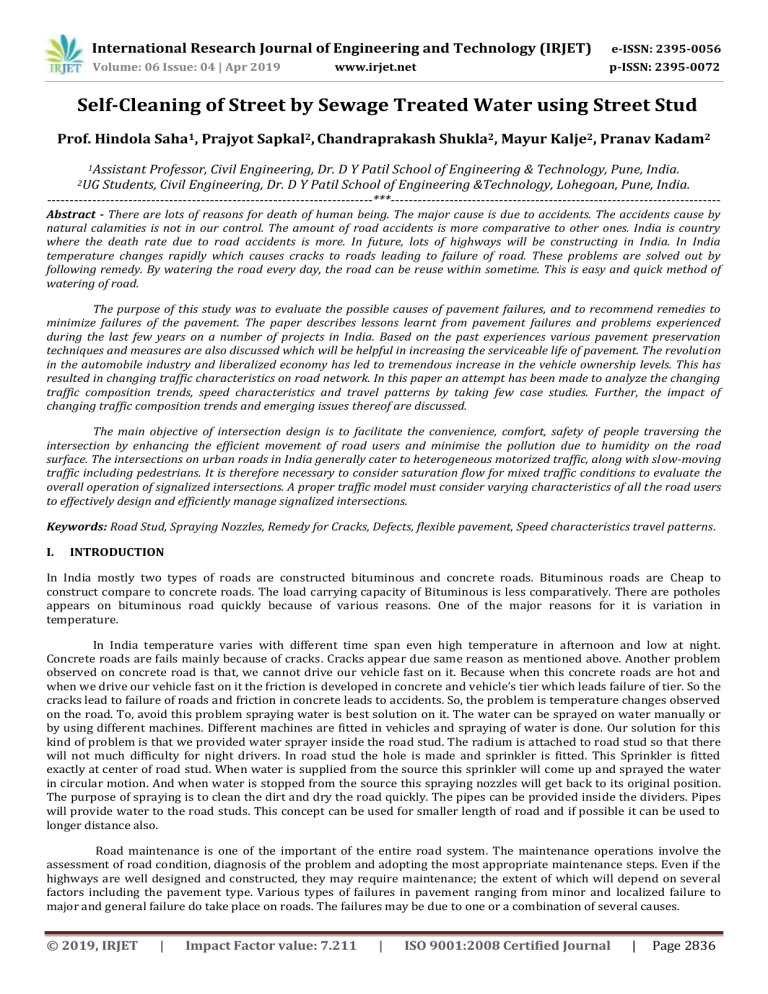
International Research Journal of Engineering and Technology (IRJET) e-ISSN: 2395-0056 Volume: 06 Issue: 04 | Apr 2019 p-ISSN: 2395-0072 www.irjet.net Self-Cleaning of Street by Sewage Treated Water using Street Stud Prof. Hindola Saha1, Prajyot Sapkal2, Chandraprakash Shukla2, Mayur Kalje2, Pranav Kadam2 1Assistant Professor, Civil Engineering, Dr. D Y Patil School of Engineering & Technology, Pune, India. Students, Civil Engineering, Dr. D Y Patil School of Engineering &Technology, Lohegoan, Pune, India. ------------------------------------------------------------------------***------------------------------------------------------------------------2UG Abstract - There are lots of reasons for death of human being. The major cause is due to accidents. The accidents cause by natural calamities is not in our control. The amount of road accidents is more comparative to other ones. India is country where the death rate due to road accidents is more. In future, lots of highways will be constructing in India. In India temperature changes rapidly which causes cracks to roads leading to failure of road. These problems are solved out by following remedy. By watering the road every day, the road can be reuse within sometime. This is easy and quick method of watering of road. The purpose of this study was to evaluate the possible causes of pavement failures, and to recommend remedies to minimize failures of the pavement. The paper describes lessons learnt from pavement failures and problems experienced during the last few years on a number of projects in India. Based on the past experiences various pavement preservation techniques and measures are also discussed which will be helpful in increasing the serviceable life of pavement. The revolution in the automobile industry and liberalized economy has led to tremendous increase in the vehicle ownership levels. This has resulted in changing traffic characteristics on road network. In this paper an attempt has been made to analyze the changing traffic composition trends, speed characteristics and travel patterns by taking few case studies. Further, the impact of changing traffic composition trends and emerging issues thereof are discussed. The main objective of intersection design is to facilitate the convenience, comfort, safety of people traversing the intersection by enhancing the efficient movement of road users and minimise the pollution due to humidity on the road surface. The intersections on urban roads in India generally cater to heterogeneous motorized traffic, along with slow-moving traffic including pedestrians. It is therefore necessary to consider saturation flow for mixed traffic conditions to evaluate the overall operation of signalized intersections. A proper traffic model must consider varying characteristics of all the road users to effectively design and efficiently manage signalized intersections. Keywords: Road Stud, Spraying Nozzles, Remedy for Cracks, Defects, flexible pavement, Speed characteristics travel patterns. I. INTRODUCTION In India mostly two types of roads are constructed bituminous and concrete roads. Bituminous roads are Cheap to construct compare to concrete roads. The load carrying capacity of Bituminous is less comparatively. There are potholes appears on bituminous road quickly because of various reasons. One of the major reasons for it is variation in temperature. In India temperature varies with different time span even high temperature in afternoon and low at night. Concrete roads are fails mainly because of cracks. Cracks appear due same reason as mentioned above. Another problem observed on concrete road is that, we cannot drive our vehicle fast on it. Because when this concrete roads are hot and when we drive our vehicle fast on it the friction is developed in concrete and vehicle’s tier which leads failure of tier. So the cracks lead to failure of roads and friction in concrete leads to accidents. So, the problem is temperature changes observed on the road. To, avoid this problem spraying water is best solution on it. The water can be sprayed on water manually or by using different machines. Different machines are fitted in vehicles and spraying of water is done. Our solution for this kind of problem is that we provided water sprayer inside the road stud. The radium is attached to road stud so that there will not much difficulty for night drivers. In road stud the hole is made and sprinkler is fitted. This Sprinkler is fitted exactly at center of road stud. When water is supplied from the source this sprinkler will come up and sprayed the water in circular motion. And when water is stopped from the source this spraying nozzles will get back to its original position. The purpose of spraying is to clean the dirt and dry the road quickly. The pipes can be provided inside the dividers. Pipes will provide water to the road studs. This concept can be used for smaller length of road and if possible it can be used to longer distance also. Road maintenance is one of the important of the entire road system. The maintenance operations involve the assessment of road condition, diagnosis of the problem and adopting the most appropriate maintenance steps. Even if the highways are well designed and constructed, they may require maintenance; the extent of which will depend on several factors including the pavement type. Various types of failures in pavement ranging from minor and localized failure to major and general failure do take place on roads. The failures may be due to one or a combination of several causes. © 2019, IRJET | Impact Factor value: 7.211 | ISO 9001:2008 Certified Journal | Page 2836 International Research Journal of Engineering and Technology (IRJET) e-ISSN: 2395-0056 Volume: 06 Issue: 04 | Apr 2019 p-ISSN: 2395-0072 www.irjet.net Maintenance of a road network involves a variety of operations, i.e., identification of deficiencies and planning, programming and scheduling for actual implementation in the field and monitoring. The essential objective should be to keep the road surface and appurtenances in good condition and to extend the life of the road assets to its design life. Broadly, the activities include identification of defects and the possible cause there off, determination of appropriate remedial measures; implement these in the field and monitoring of the results. This will involve several subsystems of identification, evaluation, planning, scheduling, management of men, material and machinery and then performance evaluation. 1) To identify type and classification of common defects in flexible pavements. 2) To identify the causes of these defects and suggest remedial measures. 3) To identify the defects in existing pavement maintenance practices. 4) To rectify the identified defects for smooth movement of traffic flow. II. OBJECTIVES 1) To decrease the dust nuisance from road surface. 2) To reduce the development of cracks on roads. 3) To increase the durability of the road. 4) To decrease the death rate by minimizing the accidents 5) To reuse the treated water from the Sewage Treatment Plant. 6) To reduce the air pollution which contain particulate matter 2.5. III. METHODOLOGY The project will move further in the direction stated above as in completion of the project, there should be a systematic procedure viz., Selection of site – we are looking for the site in Ajeenkya D Y Patil University Campus near the sewage treatment plant. After site selection the materials required for conducting project like the street stud, centrifugal pump, conveyance pipe etc. Further to know the various geometric components of the road and there characteristics become essential consideration for designing the discharge, velocity of flow, camber of road, width of road, side drains available, type of pavement, etc. as well as the climatic conditions and metrological condition like temperature and wind speed respectively. The quality of water after treatment from the sewage treatment plant should meets CPCB recommendations like pH-6.5-8.5, etc. assuming the design consideration we will adopt it in practical performance of the project and the feasibility of the project will results in the proper and efficient working model for the same for demonstration and visual performance of the self-cleaning of street using street stud. A. Materials: As per the given procedure of the Project Material Collection is the main motto for the on-going process of project. Various materials are collected for the completion of the project is as follows Materials for Practical Approach on Site Spray Nozzle Pipe Pump B. Method: 1) Determination of pH Value The pH value for the Sewage Treated Water is found out because the water plays the main aspect in the application of Road durability and also the effectiveness of the safety purposes. If the pH value is between the desirable limit then it is applicable. The test on pH of water is carried out by the pH meter and the pH paper. The value of the pH is in between the 6.5 to 8.5 and our value has come 6.7, so it is applicable for the road life. © 2019, IRJET | Impact Factor value: 7.211 | ISO 9001:2008 Certified Journal | Page 2837 2) International Research Journal of Engineering and Technology (IRJET) e-ISSN: 2395-0056 Volume: 06 Issue: 04 | Apr 2019 p-ISSN: 2395-0072 www.irjet.net Dimensions of Nozzle Stud Dimensions of rectangular stud are 8cm in length and 5cm in width. The rectangular stud maintaining velocity of 3m/sec which helps in cleaning of road and spraying the water in 3 direction of jet and later that water will drain out in side drain. Circular Stud having the dimensions of 7 cm diameter which sprays the water in 2 directions. 3) Sewage Treated Water and Side Drain We collect the sewage treated water for the practical approach, then water is sprayed with the help of nozzle on the road, then water is drain out in order of velocity and sloping characteristics then water is collected in side drain. Adequate drainage is a primary requirement for maintaining the structural soundness and functional efficiency of a road. Pavement structure including subgrade must be protected from any ingress of water; otherwise over a period of time it may weaken the subgrade by saturating it and cause distress in the pavement structure. That is why rapid dispersal of water from pavement and subgrade is a basic consideration in road design. Also, proper drainage takes away the water from pavement surface quickly and reduces the chance of skidding of vehicles. The intercepting drain in a cut section located away from the road pavement, the side ditch at the toe of the road embankment, the road pavement with its crown and camber, the dressed shoulders, the side-slope chutes, the sub-surface drains, the kerb inlets, underground storm water drains, culverts, bridges, all form the elements of the total drainage system to protect and ensure unhindered performance of the constructed road. IV. OUR SOLUTION One similar system is use in South Korea in which the water is sprayed on water with nozzles provided on side of road stud. We perform the practical application of water jet on the road in front of Sewage Treatment Plant near the International School. Firstly we installed the equipment on position and allow the water flow from SPT through pipe by desire (3m/sec) flow of water. We have made a model consist of roads through divider and water is applied from the both sides of the divider that cleans the dust on road. The application of drainage system through the sides of the road makes the water from the road flow through drainage pipe. The application of water jet is made by Submersible Pump with water tank and through it the pressure of water is maintained on the road model and the water through drainage is again get transferred in the water tank. Repeated procedure is also carried out on the model. V. ADVANTAGES 1) Temperature of the road is maintained. 2) Cracks on the roads are avoided. 3) Life of the road can be increased. 4) Dust from the road is cleaned. 5) Aesthetic of the road is increased. 6) Heavy machineries are avoided. VI. CONCLUSIONS The above paper gives solution for road washing problems. This technique is used in South Korea, but this can also be used in India. The above paper gives the detail description about all the advantages of this technique. Road washing is a good for its aesthetic and durability. So to maintain road washing works the road stud can be very useful at dividers preventing it from breaking from vehicles due to its advantages of using it. © 2019, IRJET | Impact Factor value: 7.211 | ISO 9001:2008 Certified Journal | Page 2838 International Research Journal of Engineering and Technology (IRJET) e-ISSN: 2395-0056 Volume: 06 Issue: 04 | Apr 2019 p-ISSN: 2395-0072 www.irjet.net VII. REFERANCES [1] Prof. Om Vaidya, et al. Review Paper on Self Cleaning Roads with Road Stud. IJSRD - International Journal for Scientific Research & Development| Vol. 5, Issue 11, 2018 | ISSN (online): 2321-0613, Page No. 704, 705. [2] PUBLIC WORKS DEPARTMENT, Government of Delhi, Urban Roads Manual (Second Edition) Published by Public Works Department Government of Delhi Printed on December 2014 [3] Bernard Wright, et al, United States Patent, Self-Cleaning Reflective Road Marker, 262,795, May 11, 1981 [4] Self-cleaning reflective road marker Patent US44113923. [5] ‘Review Paper on Defects in Flexible Pavement and its Maintenance’ International Journal of Advanced Research in Education & Technology (IJARET), Vol. 4, and Issue 2 (April - June 2017), ISSN: 2394-6814. [6] IRC-106-1990 Guidelines for capacity of urban roads. [7] ‘Nozzle Wear Parameter in Water jet machining The Review’ Saurabh Verma et. al. IJEDR, Volume 2, Issue 1, ISSN: 2321-9939. [8] USD244764 US patent by D. Swarovski & Co. titled ‘Road-traffic stud’. [9] https://dir.indiamart.com/nashik/sprinkler irrigation system.html © 2019, IRJET | Impact Factor value: 7.211 | ISO 9001:2008 Certified Journal | Page 2839
